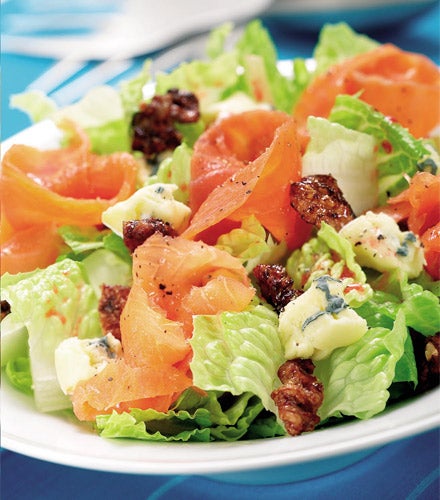Revealed: the diet that can protect you against heart attacks

The health benefits of eating extra fruits and vegetables are well established: for years, children have been told that an apple a day will keep the doctor away.
But now, scientists have identified a diet promoting a much wider range of foods, including fish, poultry and nuts, that they say is much more effective at cutting the risk of heart attacks.
The Dash (Dietary Approaches to Stop Hypertension) dieting plan reduces the chances of suffering from heart disease by 18 per cent over 10 years, compared with an average American diet. People who simply up their consumption of fruits and vegetables see an 11 per cent decreased risk, a study shows.
The plan, also recommended by the American Heart Association, emphasises consumption of low-fat dairy products, whole grains, poultry, fish and nuts as well as fruits and vegetables. It also calls for a reduction in fats, red meat, sweets, and sugary drinks.
Dr Marilyn Glenville, a nutritionist, explained that the high intake of fruits and vegetables, whole grains, poultry, fish and nuts, combined with relatively low-fat dairy products and less sugar and red meats, would help to decrease the levels of cholesterol in the body. In turn, that would reduce the chances of heart disease, she said.
"Cholesterol causes a problem when it oxidises in the body and the antioxidants in fruits and vegetables prevent that from happening," she said. "People should try to eat as many different colours as possible: they need to eat a rainbow." She said that eating low-fat dairy products would "limit the damage" caused by cholesterol.
Dr Glenville also explained that the whole grains recommended would provide fibre, "which mixes with cholesterol in the intestine, helping to push it out of the body". She added that the relatively slow breakdown of whole grains "maximise their cholesterol- and blood glucose-reducing effects".
She added: "Poultry, fish and nuts do not have as much saturated fat as red meats do, they also contain more Omega-3, which controls inflammation of the arteries and, in some cases, of the heart itself. That inflammation, along with cholesterol, is often the cause of heart disease. Sugary drinks and sweets have the opposite effect."
Nisa Maruthur, who co-authored the study, said: "The research would seem to suggest that eating a more balanced diet is important to reducing the risk of heart disease, but don't underestimate the value of fruits and vegetables."
The research, published in the American Heart Association journal Circulation: Cardiovascular Quality and Outcomes, also shows that the Dash plan reduces LDL cholesterol – so-called "bad cholesterol" – by 8 per cent and reduces blood pressure, compared with the standard American diet.
Asked if the same results could be expected in the UK, Maruthur, who is the assistant professor of medicine at Johns Hopkins Medical Institutions in Baltimore, confirmed she would expect to see a similar outcome in a country with a comparable diet.
The plan was found to be more effective among black people than among white, Maruthur said, adding: "This study provides further evidence that we can make a significant impact on the heart health of the general population by promoting the Dash eating plan.
"This is not a diet that is difficult to maintain. It includes all types of foods."
How the diet works...
Fruits and vegetables
Antioxidants from fruit and vegetables are the diet's most important components. Cholesterol becomes a problem when it oxidises, but this can be stemmed by antioxidants. The pigments in fruits carry different antioxidants.
Low-fat dairy foods
The diet maximises the positive effects of fruits and vegetables, and limits the damage caused by saturated fats in dairy foods by eating low-fat versions.
Whole grains
When the fibre from whole grains is stripped away from foods, they are digested more quickly, causing a rise in blood glucose and bad cholesterol.
Poultry, fish and nuts versus red meat and sugary foods
The former do not have as much saturated fat as the latter and contain Omega-3. Sugar enters the bloodstream quickly, causing high blood glucose and high cholesterol.
Join our commenting forum
Join thought-provoking conversations, follow other Independent readers and see their replies
Comments